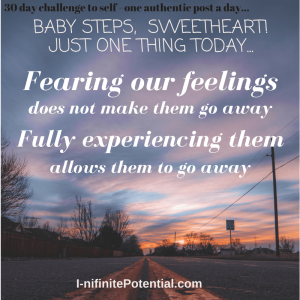We have this overriding fear of feeling our negative feelings.
We will do anything not to feel them! We will stuff them down relentlessly with distractions. We will build thick walls to keep out the possibility of being hurt again out. We will deny their existence. We will prevent hurt at all costs by over-controlling every minute detail we possible can. We will self medicate with work, alcohol, chocolate, sleeping pills and the whole range of mood altering legal and illegal substances out there.
Just so we do not feel.
Doctors prescribe anxiety medications instead of finding the root cause of the anxiety. They dull our senses with anti-depressants when we actually need to feel in order to truthfully grieve and process our feelings – in order to authentically heal.
Not feeling our feelings is hurtful to us physically, mentally and relationship-wise. Yet it is the absolute last thing we wish to experience or share. We just. Do. Not. Want to be vulnerable.
“The basis of all integrity is accepting what’s happening in the present moment. Fighting reality, through denial, minimization, fantasy, or avoidance, puts everything we think and do on a wobbly foundation. To accept reality, we must allow ourselves to know everything we know and feel everything we feel—not ten minutes ago, not ten minutes from now, just right at this very moment.”
– Martha Beck
Physical Damage
High blood pressure, sleeplessness, acid reflux, psychosomatic illnesses, migraines, lower immunity and adrenal burnout are some of the effects of suppressing our emotions, or of not having healthy ways in which to view life and the feelings that arise because of our world view. There is enough evidence out there, if we want to be convinced that we are actually harming ourselves with this refusal to feel feelings we perceive as negative:
Here is a good article from Psychology Today – well worth the read, as well as a couple of others:
http://articles.mercola.com/sites/articles/archive/2014/01/30/eft-mapping-emotions.aspx
http://www.mysahana.org/2011/05/emotion-suppression-effects-on-mental-and-physical-health/
Mental Damage
We are over medicated and we easily buy the labels doled out to us, when doctors and psychiatrists run out of options. We accept and proudly wear the labels that we are depressed, have anxiety disorder, have OCD (No jokes, a lack of emotion is a symptom of OCD!), are diagnosed with borderline personality disorder (seriously, what is that???). We get confused between all the side effects we suffer from the one thing that causes the other thing that the next medication is supposed to fix.
And all along we were just supposed to legitimately feel our feelings, process them and accept them. Sad is sad, people. Anger is often justified. Hurt is a very real thing. And all of these feelings have a role to play as we grow ourselves up and learn to have better coping skills.
Relationship Damage
The reason we shut down our feelings and build our walls is very obvious. We have decided that we will just not feel that hurt and sorrow again. The only problem is that it is a very effective way to shut people and relationships and connection and intimacy out of our lives. And that is such an undeniable human need, that this strategy just will not work. And in the end, all we ever achieve is exactly the opposite of what we need – we push away the very people we want and need most in our lives.
Unfortunately we very often manage to find one co-dependent relationship that we to latch onto, and this “completing of each other”, to the extent of shutting out the rest of the world, prevents us from forming meaningful mutually supportive relationships with other people. This relationship addiction to another is as limiting, as controlling, as habit forming and as addictive as crack cocaine. And just as bad for us in the end.
So between shutting out people and forming co-dependent relationships on the other hand, how do we find balance?
How do we not get enmeshed in that one relationship, that one friendship, the job we give-give to until we are depleted?
- We widen our circle of support.
- We apply self-love, self-care, self-respect… from this day forward.
- We become available to our feelings.
- We ask for help, and graciously accept help.
- We decide to do things differently, one thing at a time.
Baby steps Sweetheart.
There is just one way to experience feelings, and that is not by going around, but by going through it. Or in my friend Jenetta’s words: “Honour your grief”
One thing at a time.
We will get through it.
Much love
Louise
